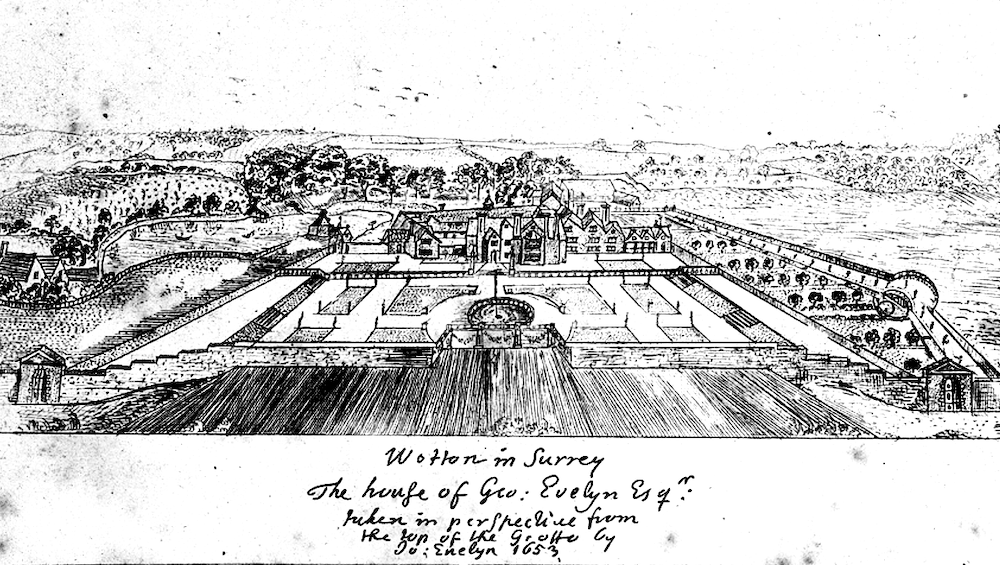
Close

Built: 1618
Wotton House dates back to the 16th century when the Evelyn family bought the estate. Since then, the estate has been passed through several generations of the Evelyn family, who still own it today. Wotton Estate was passed to John Evelyn, a famous botanist and arboriculture expert, from his father, Richard Evelyn. John is responsible for the incredible gardens at Wotton House, which are one of the main features of the Estate today. John had spent much of his youth travelling across Europe, and he became mesmerized by the Italian Renaissance gardens he visited in Italy. He then returned to Wotton House and built its very own Italian Garden and temple adorned with Roman temples and original mosaics. It was designed in 1652 by his cousin, Captain George Evelyn, and is one of the first gardens of its kind in the United Kingdom. The gardens at the property have been protected and listed as Grade II, adding to its incredible uniqueness.

George Evelyn – Born in 1526 in Kingston Upon Thames, England and Died in 1603 in Wotton House, England
David Owen – Lands- Born in 1459 in Midhurst, England, Married Mary Dehohun, and Died in 1535
John Evelyn – Born in 1554 in Long Ditton, England, Married Elizabeth Stevens, and Died in 1627 in West Dean, England
Richard Evelyn– Born in 1587 in Wotton House, England and Died in 1640
George Evelyn – Born in 1592 in Godstone, England, Married Jane Crane, and Died in 1649
A country estate like no other, Wotton House is set amongst acres of gardens and the surrounding Surrey Hills – an area of outstanding natural beauty. The tranquil River Tillingbourne flows through the estate, which also once held a mill used for the manufacture of gunpowder. Home to famous botanist John Evelyn in the 17th century, the gardens of Wotton House are hugely impressive, comprising England’s very first Italian Garden replete with Roman temples, original mosaics, and charming grottos that combine style, sophistication, and a heritage of horticulture and creativity.
The Evelyn family owned Wotton House for centuries, having purchased it from the Owen family, and were fully immersed within their community, employing many of the local villagers in their various gunpowder mills or within the house itself. A distinguished and intellectual family, the many inhabitants of Wotton House included George Evelyn, who was appointed High Sheriff, and John Evelyn, a famous diarist. And yet, it was the botanist and arboriculture expert, John Evelyn, whose eccentricity and creativity is embodied and celebrated on the estate to this day.
John Evelyn was considered a pioneer of his time, owing to his passion about the role of plants in our diets; he lived as a vegetarian during a time when this was incredibly uncommon. His primary contribution is still the estate’s main feature, the Italian Gardens, which have been deemed worthy of protection and are, remarkably, individually Grade II listed. The gardens’ particular architectural features include distinctive terracotta decorations on brickwork, octagonal turrets and stacks, winged gryphons, and panels painted in a Chinese style by Belgian Jean Derraux.
Throughout the 18th and 19th centuries, the house was carefully extended and altered by members of the Evelyn family, including the addition of a secluded and idyllic walled garden and a menagerie near the house, which once housed Kangaroos that are rumoured to have once escaped into the village! Following the ownership of the Evelyn family, the house was leased to the Home Office and used as the Fire Service College before being fully refurbished in preparation to welcome guests from far and wide. In its new chapter as a hotel, Wotton House remains a grand estate with an enduring and inspiring sense of warmth, charm and individuality.